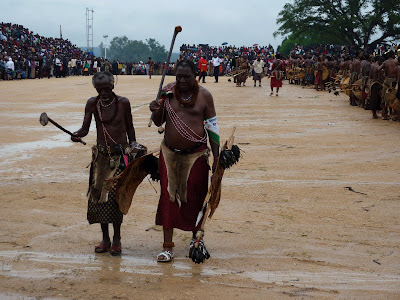Well, I’m now into my ninth week here so it’s probably time to reflect on what it’s like working in Swaziland.
The most striking thing is the concept which is variously referred to as African time or Swazi time. I know my past performance on punctuality wouldn’t win me any prizes (though I like to think I’ve got better over the last few years), but even I’m bewildered by the lack of awareness of time. I went to a conference last week which was supposed to be an 8.30 start. Over 60 people were invited, 24 of us had arrived by 9 o’clock. By 9.30, another 10 or so had drifted in, and the same again by 10.30. No apologies, no hint that there was anything amiss. That afternoon we got to a 2pm meeting at 3pm, only to find that the chairperson arrived 20 minutes after us.
But it’s not just the time-keeping. People get randomly invited to meetings with so little information that the meetings are anything between ineffective and useless.
However the upside of being randomly invited to meetings in such a small country is that I’m getting exposed to all sorts of stuff which I wouldn’t see if I was in a larger one. In the short time I’ve been here, I’ve been to government meetings on the economic empowerment of women, on whether they should introduce student loans, on preparing a UN report on progress against the Millennium Development Goals, and a meeting with the International Labour Organisation today on the rights of Swazis who work in South Africa. A lot of it is fairly depressing and frustrating, though it’s all good learning on how difficult it is to get things done.
Possibly the most depressing day was the one with the 8.30(!) conference I referred to above. It had been called by the Ministry of Economic Planning, ostensibly to engage/involve (depending on how technical you want to get) different groups in preparing the 2010 report on how Swaziland is performing on the UN’s Millennium Development Goals (MDGs). The cynics would say it’s to show they’ve engaged people, and as such it was a complete shambles.
The organisers wanted people to volunteer to work on each of the eight MDGs. When they got to Infant Mortality, there was only one person out of the 43 present who wanted to work on it. Maternal Mortality, only one person – the same one. HIV – you guessed it, the same person. This is a country where HIV has inflicted the most terrible burden. Since it hit Swaziland, infant mortality has increased – 12 out of 100 children die before their fifth birthday, maternal mortality has doubled, and 40% of pregnant women between 15 and 24 are HIV positive.
To add insult to injury, the organisers then decided to split people up arbitrarily into groups. I ended up working on HIV and I think it’s fair to say that we were all pretty clueless. To make it even worse, our group prepared our feedback on a PC which we couldn’t get working, and the facilitators decided we should just ‘leave’ HIV. That’s pretty scary for a country with the highest prevalence of HIV in the world. Thankfully some bright spark suggested this wasn’t such a bright idea. It was utterly depressing.
This wasn’t helped by the fact that the afternoon meeting was about a trade summit to be held in Swaziland in August. When we got on to the budget, the local organisers had to explain to some visiting organisers that it had increased because the King has agreed to be a keynote speaker. This means that they will need to fund a private kitchen (he won’t eat from anywhere else) and they will have to support his entourage of 100-200 people. To go from a conference talking about such terrible issues (the one I forgot to mention is that over 40% of the population don’t have enough to eat) to funding the King’s private kitchen is a little surreal. I think my face probably spoke volumes...
And then there’s my job, which isn’t going so well. Forget the lack of desk and chair – years as a consultant prepares you for that – it’s the fact that FESBC is really an organisation in name only. There's no money, and very little energy or drive from most of the Board members. Anyway, there’s lots happening on that front and a Plan B (in Swaziland, no intention of giving up so soon) so I’ll write something on it next (for anyone who’s read this far!).
 Well, it’s been a while since I posted anything, there’s been lots going on. I’ve had lots of issues with work, so a couple of weeks ago I made the decision to resign and head back to the UK. I’ll be leaving Swaziland on 20 May and heading to Australia for Con’s Dad’s 70th birthday, and will be getting back to London on 8 June. All a bit disappointing, but it’s certainly been a learning experience (as they say!).
Well, it’s been a while since I posted anything, there’s been lots going on. I’ve had lots of issues with work, so a couple of weeks ago I made the decision to resign and head back to the UK. I’ll be leaving Swaziland on 20 May and heading to Australia for Con’s Dad’s 70th birthday, and will be getting back to London on 8 June. All a bit disappointing, but it’s certainly been a learning experience (as they say!).













